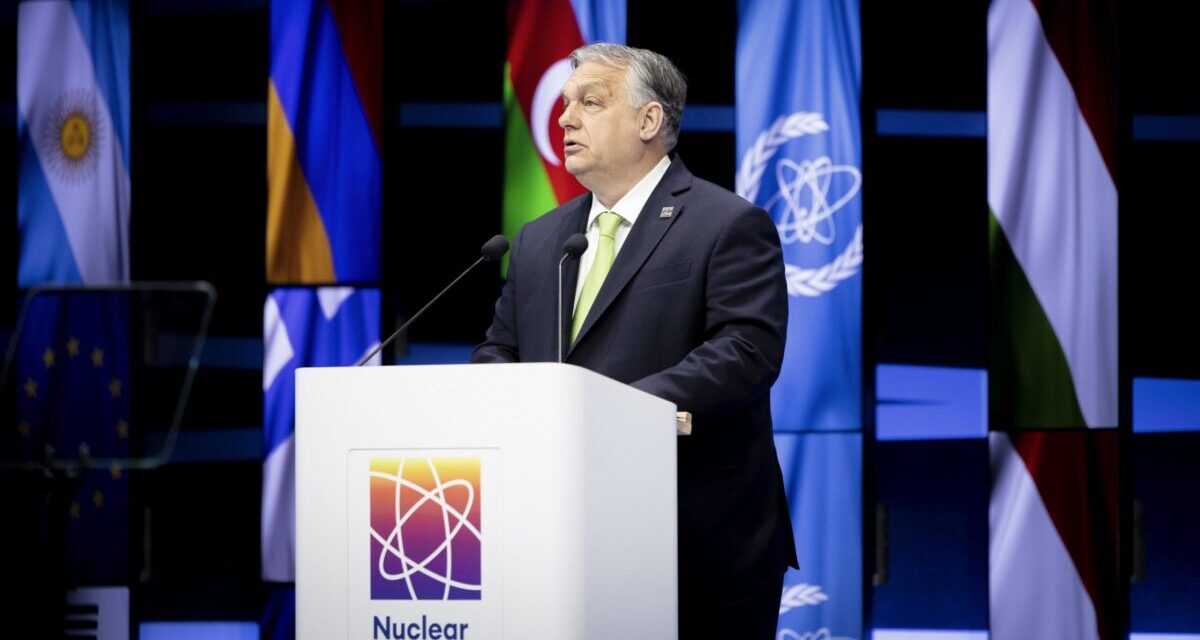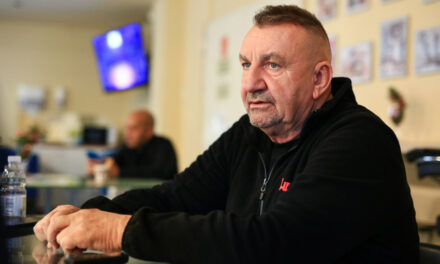The Brussels paper noticed with alarm that the European right-wing is getting stronger, and that the Hungarian presidency comes at the same time as the possible re-election of Trump.
Orbán represents a new, dangerous Euroscepticism that could reshape the European Union - Politico warns its readers with fear: in the Brussels paper's 10-point analysis, it examines the soft power tools deployed by the Hungarians in Brussels as well as the Prime Minister's aspirations, while alarmingly stating that the Hungarian EU -presidency coincides with the American presidential election, and Orbán and Trump are allies.
"Hungary - in the words of Viktor Orbán - is preparing for war"
– the writing starts with an ominous tone and maintains this tone, which can hardly be called neutral, throughout the next 15 thousand characters; this generosity is not without precedent from the Brussels paper.
"We must occupy Brussels!" – this sentence of the prime minister particularly captured their imagination, and they derive the rest from here.
It is indicated.
The old narrative, "Orbán has long reviled the EU", "used him as a scapegoat" for the populist "us or them" fight, where he represents a right-wing ideology based on traditional family values and nationalism, comes to the fore.
Then he increases this: since April 2022, "Orbán's tone has changed, and his attitude towards the EU has also changed. In the Hungarian leader, the EU is facing a new kind of Eurosceptic who does not want to leave the bloc, but wants to shape it"
From the question of supporting Ukraine to climate change to migration.
In addition, it is not possible to build and prepare for the consecutive presidency in Brussels, which coincides with the expected right-wing breakthrough in the European Parliament following the elections.
The article particularly criticizes the fact that the Hungarian government is trying to position itself in Brussels in the same way as anyone else. The criminal record therefore includes "Hungary's soft power offensive in Brussels", as the article puts it.
An example is the purchase and renovation of the former Belgian Ministry of Finance building by July, when Budapest takes over the presidency of the EU Council, which will also function as a meeting place. The Belgian and Luxembourg ambassador, Iván Tamás Kovács, interviewed by Politico, simply called this a "Hungarian house", the however, according to the author of the article, "the castle is just the latest addition to Budapest's ever-increasing soft power offensive by Brussels".
But even more frightening for the author is the appearance and strengthening of the MCC in Brussels.
"This is a think tank supported by Orbán", they write, which "represents an unrelentingly conservative position on EU affairs", with which it does not intend to disturb the stalemate in Brussels.
The MCC received funds, the article complains, at a time when "the press intensified" for other academic actors, such as "at the Central European University supported by György Soros". The goal is to "infuse the next generation of Hungarian talent with conservative values", and MCC does not hesitate to provide scholarships and jobs for children from poor backgrounds.
"They have a chance to become Hungary's next-generation leaders, not only in the political, but also in the cultural, economic and business spheres," the newspaper quotes Balázs Orbán, who is also quoted as refuting the idea that total unity in the EU would actually be divisive issues.
At MCC's last event in Brussels, the paper also quotes Frank Füredi, who also announced his opposition to gender politics and a culture that flirts with the destruction of the past, but MCC actively dealt with farmers protesting against the green program and the LGBTQ lobby, and warned in the direction of the United States of Europe to Brussels' efforts - Politico lists the organization's "crimes".
And finally, the English-language newspaper The European Conservative, financed by the non-profit Lajos Batthyány Foundation, also appears.
The article speaks to Zsuzsanna Szelényi, the program director of the CEU Democracy Institute (who did put the beginning of the end of Fidesz in 2019 - ed.), according to whom Orbán has not yet been challenged at home, and does not have to fear the loss of power - apart from Péter Magyar, about whom " it is not yet clear whether it will prove to be a serious threat".
According to him, the confidence of the prime minister is that he builds relations with the conservatives of Europe and America, and "he also wants to influence the European political culture. Brussels is the cornerstone of this.”
"All signs point to a shift to the right," continues Politico regarding the June EP elections
"with the rise of populist and nationalist parties, and the loss of mandates of centrist and left-wing forces", while Hungary would hold the consecutive presidency. They add that Orbán is meanwhile "rubbing" with right-wing European leaders such as Italian Prime Minister Giorgia Meloni, French far-right leader Marine Le Pen and Slovak Prime Minister Robert Fico. They quote him from his on-stage interview at the Diplomatic Forum in Antalya as saying that
"I'm trying to play a role in unifying the right and sweeping away the socialist, leftist, progressive, liberal dangerous figures."
However, the paper notes with a bit of sarcasm that Fidesz has been "politically homeless" in the EU since it left the European People's Party, but - to the great fear of Brussels - it boasts that it can join the Meloni-led right-wing European Conservatives and Reformers (ECR) group, which refers to several meetings; although "the far-right Swedish Democrats and the Czech Civic Democrats" threatened to withdraw in this case, if this does not happen and Fidesz joins, the ECR may be the third largest force in the EP after June.
According to Politico, Orbán criticizes "bureaucracy, migrants, the 'LGBTQ agenda' and blocks aid to Kyiv," but what he and his entourage "don't do is recommend leaving the EU."
Speaking to the paper, András Bíró-Nagy, director of Policy Solutions, who also wrote an article on the far-left Mércén, explains: in fact, the Hungarian government only opposes Brussels rhetorically, it agrees with it on 85-90 percent of things, and the social support for the EU is also high, exit is not popular even among Fidesz supporters, therefore "Orbán cannot play with Hungary's EU membership, this is a red line".
From there, the paper leads back to the question of sovereignty: the cunning Orbán does not want to quit, but asks for more power - sovereignty - for the national governments.
According to Politico, this means for the Hungarians that they insist on the veto right and the consensus of the 27 member states in decision-making, and they use it: they block sanctions against Russia, global taxation, and the financing of Ukraine.
In particular, they blame Orbán for blocking in relation to uncontrolled migration, as well as in relation to the EU Green Deal in the interests of farmers, saying that their concerns about Brussels' "irrational" "green ideology" are justified.
In response to a question from Politico, Balázs Orbán said: "Neither in foreign policy nor in joint credit projects do I see a willingness in Hungary to further surrender sovereignty," he said, saying that "this never-ending federalization" must be stopped.
In Brussels, therefore, they are particularly not happy that the Hungarian presidency is now coming,
and they doubt that the Hungarian Prime Minister will put his national interests aside in this position, especially since the Minister of Foreign Affairs and Trade Péter Szijjártó said that the issue of illegal migration will be the focus of the country's consecutive presidency, because a sharp change is needed in Brussels in this area.
In addition, they are also annoyed by the fact that Budapest wants to continue the EU enlargement program, but not in the direction of Ukraine, but in the direction of the long-awaited Western Balkans; but also because the green goals are not in focus either.
And of course, as in everything, there is also the issue of the rule of law here, in connection with which the European Parliament questioned in a resolution whether Hungary "deserves" the consecutive presidency at all. In addition, it is quoted that the Hungarian leader is friends with American conservative TV host Tucker Carlson, he welcomed the news of Trump's re-election, congratulated Putin on his election victory and even Chinese President Xi Jinping called him a "friend" of Beijing. Well, this man will put his stamp on EU politics - Politico is horrified.
The Brussels paper's article ends with an alarming ending: the Hungarian EU presidency and the US presidential election will take place at the same time.
"A new European right-wing party, of which we Hungarians are also a part, can bring real change," Orbán's annual evaluation is quoted as saying: "Brussels Abcúg. Long live Europe!"
Cover photo: Prime Minister Viktor Orbán speaks at the first summit of the European Nuclear Association in Brussels on March 21, 2024.
MTI/Prime Minister's Press Office/Zoltán Fischer












